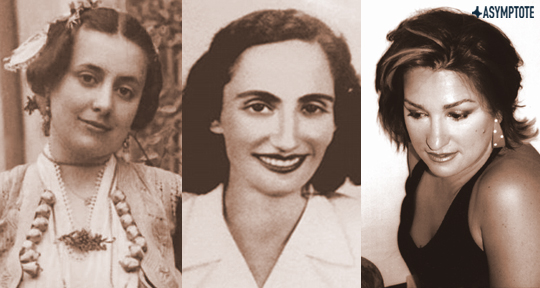This week’s Translation Tuesday features the devotional work of Nadia Anjuman. Under pressure, the poems sing out—but not so much to the divine Patriarch as do many religious songs. Created under political pressure in Afghanistan, Anjuman’s poems speak to a feminine subject free from repressive structures. When she says “If one strand of hope finds me” one gets the impression that the “me” is the subject who speaks free of the restraints of strict gender norms. The self is shuttled into wispy metaphors of string and haze, surviving, on the back of lyric, as opaque lightness. The style of Islamic mystics is breathlessly combined with resolutely feminist concerns—the result is a dire urgency. Anjuman ultimately died under the same oppression she was writing against, and her poems give testament to the pervasiveness and resilience of song. The stakes are high here—read carefully. READ MORE…
Language: Persian
Translation Tuesday: “The Most Solemn Song” and “Asleep in a Haze” by Nadia Anjuman
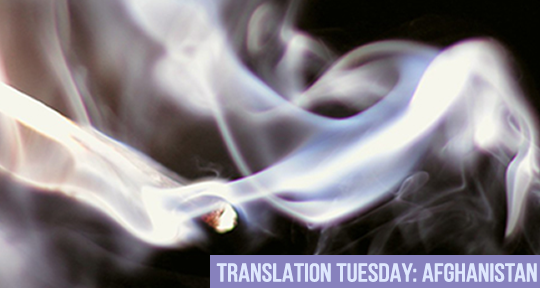
No one reads the book of your heart’s happy anthems
Weekly Dispatches from the Front Lines of World Literature

On Terezín, censorship in Iran, thrilling new Uzbek titles, and the long-awaited Nobel Prize for Literature announcement.
This week is an exciting one in the world of literature, and our editors are bringing you dispatches from the ground. Xiao Yue Shan discusses the winners of the 2018 and 2019 Nobel Prize in Literature. Julia Sherwood reports on a march from Prague to Terezín, a concentration camp established by the Nazis during their occupation of the Czech Republic. Poupeh Missaghi gives an account of literary podcasts in Iran, as well as the government’s role in quality control and censorship. Filip Noubel brings us an introduction of several new titles from the established authors of Uzbekistan.
Xiao Yue Shan, Assistant Blog Editor, reporting on the Nobel Prize for Literature
The long-awaited Nobel Prize in Literature announcement of 2019 was prefaced by the usual barrage of news and predictions—some cynical, some vaguely hopeful, and most of which hedged their bets on women writers and/or authors who did not write predominantly in English. After the controversy of last year’s award (or the lack thereof), it followed a natural trajectory that our current politics lead us to search for brilliant literary representation that breaches the limits of our accepted canon of well-celebrated white men, and the Swedish Academy had seemed eager to prove themselves to be advocates for social progress, as they once again took on the role of alighting the flames of literary luminaries that will forever be enshrined as embodiments of success in the world of letters.
In a case of half-fulfillment, the 2018 Nobel Prize in Literature went to Asymptote contributor Olga Tokarczuk, and the 2019 Prize was awarded to the prolific Austrian writer Peter Handke. The latter aroused quite the maelstrom of negative responses, even with most still acknowledging his significant contributions and his fearlessly bold oeuvre, while the former is being hailed as a well-deserving, original, feminist voice, standing in the exact spot of where the spotlight should be shone.
Weekly Dispatches from the Front Lines of World Literature

Follow our editors through Lebanon, Hong Kong, and France as they bring a selection of literary news of the week.
From the town nestled in the peaks of Lebanon, to the recent surge in Hong Kong streets, to the crystal waters of the Occitanie coast, our three literary destinations of the week bring forth an array of Lebanese love stories, reimaginings of home, and the rich culture of Mediterranean poetry. In the words of the great Sufi poet Yunus Emre, “If I told you about a land of love, friend, would you follow me and come?”
Ruba Abughaida, Editor-at-Large, reporting for Lebanon
The mountain town of Bsharri in Lebanon should see an increase in tourism following the Lebanese debut of a musical adapted from Gibran Khalil Gibran’s Broken Wings, published in 1912. Born in Bsharri in 1883, Gibran’s book The Prophet, published in the United States in 1923, is still one of the best-selling books of all time after ninety-six years and 189 consecutive print runs. Showing at Beit El Din Palace, a nineteenth century palace which hosts the annual Beiteddine festival, the musical tells of a tragic love story which takes place during the turn of the century in Beirut.
Closer to sea level, an evening of poetry in Beirut celebrated Lebanese poet Hasan Abdulla. Born in Southern Lebanon, Abdulla was inspired by its natural beauty, and infused his poetry with observations of nature. His work, spanning over forty years, has been translated into English, French, German, Spanish, and Russian.
Section Editors’ Highlights: Summer 2019
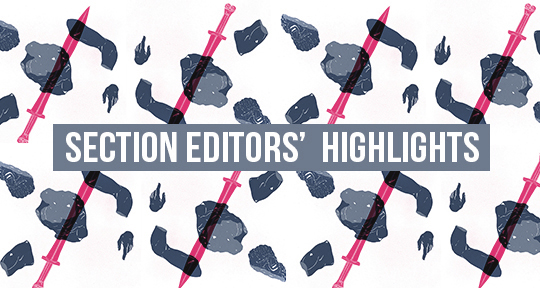
Standout pieces from the Summer 2019 issue of Asymptote, as selected by section editors!
Another issue of Asymptote means another dazzling array of voices, languages, and genres in translation. If you’re not sure where to begin, look no further than these recommendations from the editors who compiled this spectacular issue.
From Lee Yew Leong, Fiction and Poetry Editor:
This issue’s Fiction section is memorable for being the first fiction lineup in an Asymptote issue (and there are now 34 of them!) that does not include a single European author. Naguib Mahfouz and Bernardo Esquinca have already been singled out by the blog editors last week, so I’ll touch briefly on works by Bijan Najdi and Siham Benchekroun—two ambitious short stories that are remarkable in different ways. Showcasing the acclaimed narrative technique for which he was known, Najdi’s heartbreaking story “A Rainy Tuesday” (translated beautifully by Michelle Quay) unravels the thin seam between memory and reality, leading us on a nonlinear journey through grief. Benchekroun’s “Living Words,” on the other hand, is also a personal essay that exults in the very richness of language. Kudos to translator Hannah Embleton-Smith who masterfully tackled a text that leans so heavily on French phonetics to make synaptic leaps—and gave us something in English that preserves the delight of the original French. My personal favorites from the Poetry section this issue are the new translations of The Iliad by James Wilcox, which inject vigor into an ancient classic, and Tim Benjamin’s introduction of Leonardo Sanhueza, 2012 winner of the Pablo Neruda Prize for career achievement. Benjamin’s evocative translations bring into English for the first time an extraordinary poetic voice that deserves to reach a wider audience.
From Joshua Craze, Nonfiction Section Editor:
“Personal Jesus” by Fausto Alzati Fernández is a visceral study of the self that drugs make. Ably translated by Will Stockton, the prose slows down time, as we wait on the side of the highway, hoping for a fix, and then, finally, time stops, in the infinite space of the hit. Fernández explores an enchanted world, in which of all the dumb sad morass of the human animal is given the possibility of transcendence, and yet—cruelties of cruelties—it is this very transcendence that produces the animals living half-lives that stumble around his dealer’s living room. “Personal Jesus” is a love letter, written to a cleansing balm that leaves us only more pitiful than before.
Wake up where the clouds are far with Asymptote’s Summer 2019 edition—“Dreams and Reality” brings you stunning vistas from 30 countries, including new fiction from Nobel laureate Naguib Mahfouz, an exclusive interview with Edith Grossman, translator of Marquez’s Love in the Time of Cholera, and never-before-published translations of Nicole Brossard, recent winner of Canada’s Lifetime Griffin Trust Award for Poetry. In our Special Feature on Yiddish writing, published with the generous support from the Yiddish Book Center, you’ll find everything from Isaac Berliner’s dreams of ancient South America to Yermiyahu Ahron Taub’s modern-day America.
In Leonardo Sanhueza’s retelling of intimate life before, during, and after Chile’s Civil War, each poem an unforgettable portrait of a colonist, dreams are harbingers of death. In “A Rainy Tuesday,” Bijan Najdi’s nonlinear journey of grief, on the other hand, dreams are bulwarks against the almost certain demise of missing loved ones. When the veil breaks, the real returns. Internationally acclaimed Korean poet Kim Hyesoon tackles the reality of violence head-on in her latest collection, reviewed by Matt Reeck. For artist Jorge Wellesley, the emptiness of slogans lies exposed in images of rotting, blurred, or blank billboards. In a candid essay, Fausto Alzati Fernández confesses to the rituals of drug addiction, some of which attempt “to grab hold of reality and strip it.”
Our Spring 2019 Issue Has Landed!
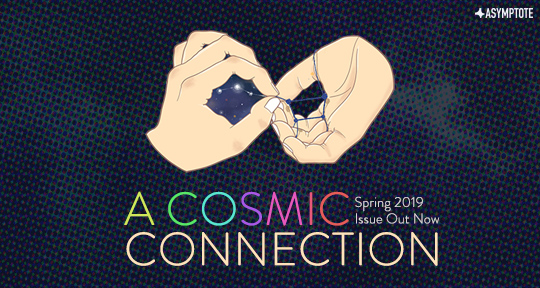
Our brand-new issue features Dubravka Ugrešić, Viet Thanh Nguyen, Raymond Queneau, and a Special Feature on Translation!
Trace “Cosmic Connections” in Asymptote’s Spring 2019 edition, including 27 countries and 17 languages from every corner of our beautiful globe! Start with our double-whammy interviews with Viet Thanh Nguyen and Dubravka Ugrešić, or dance upon our “big old blue sphere” with the illustrious co-founder of Oulipo, Raymond Queneau. And don’t miss this quarter’s Special Feature, spotlighting creative reflections on the art of translation!
Translation can transport us to exotic locales—near or far. Daniel Guebel travels the lost world of Jewish pilpul, or “spicy thought,” an ancient method of interpreting the Talmud, while reconciling with the fact that the sages’ dialectical complexities cannot heal his dying father. Yet a life isn’t a mere journey from beginning to simple end: “All roads lead anywhere,” sings acclaimed Bulgarian poet Georgi Gospodinov, “not only to death.” For Mohsen Namjoo, the road must lead beyond nostalgia for hallowed national pasts to address the problems of the present. READ MORE…
Fall 2017: The Last Space For Resistance
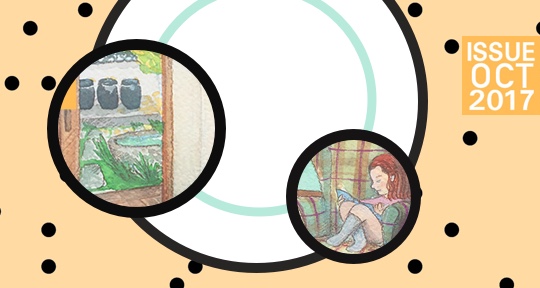
Asymptote’s most precious gift to readers: each issue guarantees a rich dastarkhan that fully embraces and celebrates diversity.
Asymptote is more than a journal—it’s a one-stop portal for world literature news. September 2017 marks a milestone for two essential columns: the second anniversary of our monthly What’s New in Translation? reports, compiling in-depth staff reviews of the latest world literature publications; and the first anniversary of our weekly Around the World with Asymptote roundups, gathering literary dispatches from every corner of the globe (not aggregates of news hyperlinks culled from elsewhere, mind you, but actual reporting by staff on the ground). Though we do reviews better than most, I’m especially proud of the latter column, which has provided first-hand literary coverage from more than 75 countries by now thanks to Assistant Managing Editor Janani Ganesan, Senior Executive Assistant Daljinder Johal, and of course our valiant blog editors who upload, edit, and proofread every single dispatch. Inconveniently (because I have been invited to speak at five panels in four cities in the last quarter of 2017, and also because the then-erratic social media team will soon need to be replaced entirely), the lump in my neck turns out to be thyroid cancer, my doctor summons me back to his office to tell me in August 2017. A few days before the first of my three hospitalizations that quarter, I share the news with my team. Just as I’m about to be wheeled into surgery, one concerned colleague emails me to say that the same influential person who demanded I pay translators two years ago is making new noise about Asymptote on social media; some PR intervention might be called for. Well, if the work my team and I’ve done doesn’t speak for itself by now, I think to myself sadly, if no one comes to Asymptote’s defence, then let it be. Though my life expectancy—one year on—remains the same as before the diagnosis, the mortality scare from that time has made me confront what to do with Asymptote—as it stands right now, we are still a long way from sustainability; no one would willingly step into my role. Will readers rally to keep us alive, if push comes to shove? Here to introduce the Fall 2017 issue and the French New Voices Feature that I edited is French Social Media Manager Filip Noubel.
I joined Asymptote in the fall of 2017. This old dream finally came true as I was sitting in Tashkent, struggling with flaky Uzbek Internet and reflecting on how my nomadic life across cultures and languages was mirrored in the history of that city where identity has always been both plural and multilingual, and where literature has often turned into the last space for resistance.
As I looked at the Fall 2017 issue of Asymptote, I felt as if I had just been invited to a literary dastarkhan. In Central Asia, when guests arrive and are invited into the interior of a traditional house to sit on the floor, a large tablecloth is thrown on the ground and rapidly filled with a mix of delicacies and treats from various parts of the region. Fruits (fresh and dry), cooked meats, drinks (hot and cold), vegetables, sweets, bread and rice are all displayed to please the eye. Despite being very different, they all contribute to the same feast. Just like any issue of Asymptote in fact: a collection of diverse texts from various corners of the world all united by an underlying theme, and carefully curated to satisfy the most curious minds. As I read this issue, I sensed it had been especially designed to please my literary taste buds.
Marina Tsvetaeva opened the gates of translation for me when I was studying translation theory in Prague, and in one of her Four Poems I could once again hear the rebellious voice that had seduced me back then: READ MORE…
Spring 2017: Fighting the Muslim Ban

We literature people must do all we can to agitate for open borders.
What follows is some lightly edited magazine correspondence leading up to the Spring 2017 edition:
January 29
Subject: A thought on what we might do as a magazine
Hello team,
I’m sure many of you are unhappy about Trump’s outrageous ban on refugees and residents from seven Muslim countries; it woke up the activist in me (and also literally kept me awake, which is why I’m writing this at 7 a.m. on a Sunday). Since we happen to have a slot open anyway, I’d like to dedicate our Spring 2017 Special Feature to authors from these countries—Iraq, Syria, Iran, Libya, Somalia, Sudan and Yemen—and perhaps we could increase the percentage of work originating from these countries in our regular sections as well—that is, if the section editors are willing and able.
To spread the word, we could tap our network of volunteer translators and commission translations into other languages as we’ve done many times before… Publishing the work in our weekly showcase at The Guardian could also get them more attention… as a matter of fact, thanks to Tomás, our editor-at-large for Chile, we have already lined up a Syrian-born poet next Tuesday.
We’d have to fundraise for this Feature to happen—and I’ll need help. To that end, I’ve added two more questions to the internal questionnaire due this coming Wednesday.
Now, I hope to set up the crowdfunding page as soon as possible, so if you feel very strongly that you’d like to be part of this effort, please email me offlist and let me know how you might contribute. For those of you who just joined, you can find an example of a previous crowdfunding effort undertaken by the magazine here (it’s usually very stressful). If support is not forthcoming, I don’t think I will go through with this Feature, as I’m already carrying a lot of magazine work and probably can’t take on the fundraising alone (which is what I did last year for our fifth anniversary events).
***
Translating Iranian Fiction: An Interview with Sara Khalili
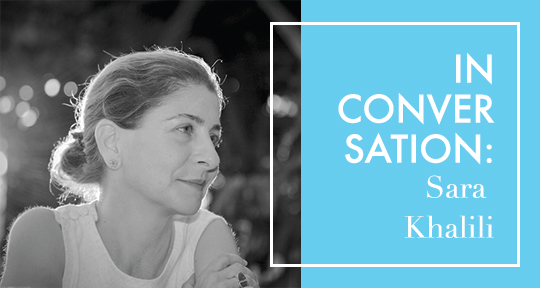
For me, the most valuable gift of my long-term working relationship with Shahriar is the trust that has developed between us.
Sara Khalili is one of a handful of translators bringing contemporary Persian literature to English readers today. Her translations include works by Shahriar Mandanipour and Goli Taraghi, among others. After several years of reading her translations and communicating with her via email, I finally met her a few months ago at a PEN World Voices event in which she was interpreting for Hossein Abkenar, another Iranian author she translates. Meeting Sara was, for me, like meeting a kindred spirit; she has a calming presence and, as with many literary translators, one can feel how this is a labor of love for her. Following the publication of Moon Brow, a novel by Mandanipour that came out with Restless Books in April 2018, we conducted this interview. She speaks to us about the peculiarities of working with Mandanipour and the larger context of her work as a translator from Persian.
Poupeh Missaghi (PM): Will you share with our readers the story of how you became a translator? And what has been the biggest reward for you as a translator?
Sara Khalili (SK): Most literary translators will tell you that their work is a labor of love. It is the same for me. I get great satisfaction from working on literature. And being deeply proud of my heritage and culture, I find it gratifying and rewarding that in my own small way I am helping introduce the literary art of Iran to an English reading audience.
By trade and training I am a financial journalist and worked in my field for many years. I only thought about translation on occasions when the late Karim Emami would tell me that I was wasting my time, that I should just quit my job and translate literature, that I had a flair for it. Karim, a dear friend and a close relative, was one of the most eminent Persian literary translators, as well as a renowned editor and literary critic. Our back and forth banter went on for several years until in 2004 he called to tell me that PEN was publishing an anthology of contemporary Iranian literature and that I should work with him on the short story he had been asked to translate. As we worked on that story, Karim guided me and educated me on the art of literary translation. I was hooked.
Several weeks later, the editor of the anthology, Nahid Mozaffari, asked if I would translate a few more stories on my own. Of course, I would!
By the way, among them was “Shatter the Stone Tooth” by Shahriar Mandanipour. It was the first time his work was published in English.
Weekly Dispatches from the Frontlines of World Literature

This week's literary news roundup brings us to Iran and Singapore.
As summer draws to a close and many of us think about quickly approaching semesters, we bring you another round of updates from around the world. Poupeh Missaghi reports from Iran, looking at how sanctions imposed on Iran have affected the publishing industry, and paying homage to a much-loved bookseller in Tehran. Bringing us the latest from Singapore, Theophilus Kwek discusses the recently announced Singapore Literature Prize as well as recent poetry publications. Happy traveling-via-laptop!
Poupeh Missaghi, Editor-at-Large, reporting from Iran:
The recent U.S. breach of the Iran nuclear deal and its new round of sanctions imposed on the country have not spared the Iranian publishing industry and its print media. Rising economic instability and a sudden drop in the value of the Iranian currency, along with other issues such as hoarding of paper supplies have led to many problems in the industry. The Iranian Minister of Culture and Islamic Guidance, Abbas Salehi, recently spoke about the matter and the attempts to stabilize the price of paper. Head of the Iranian paper syndicate, Abolfazl Roghani Golpaygani, also recently discussed a 100% increase in the price of paper in the past year which has caused newspapers and thus journalists concerns about the future of the trade. Consequently, the Iranian Ministry of Industry, Mines, and Trade just agreed with the urgent import of several tons of paper under special tariffs, but it is uncertain that this will provide a long-term solution for the problems of the industry.



